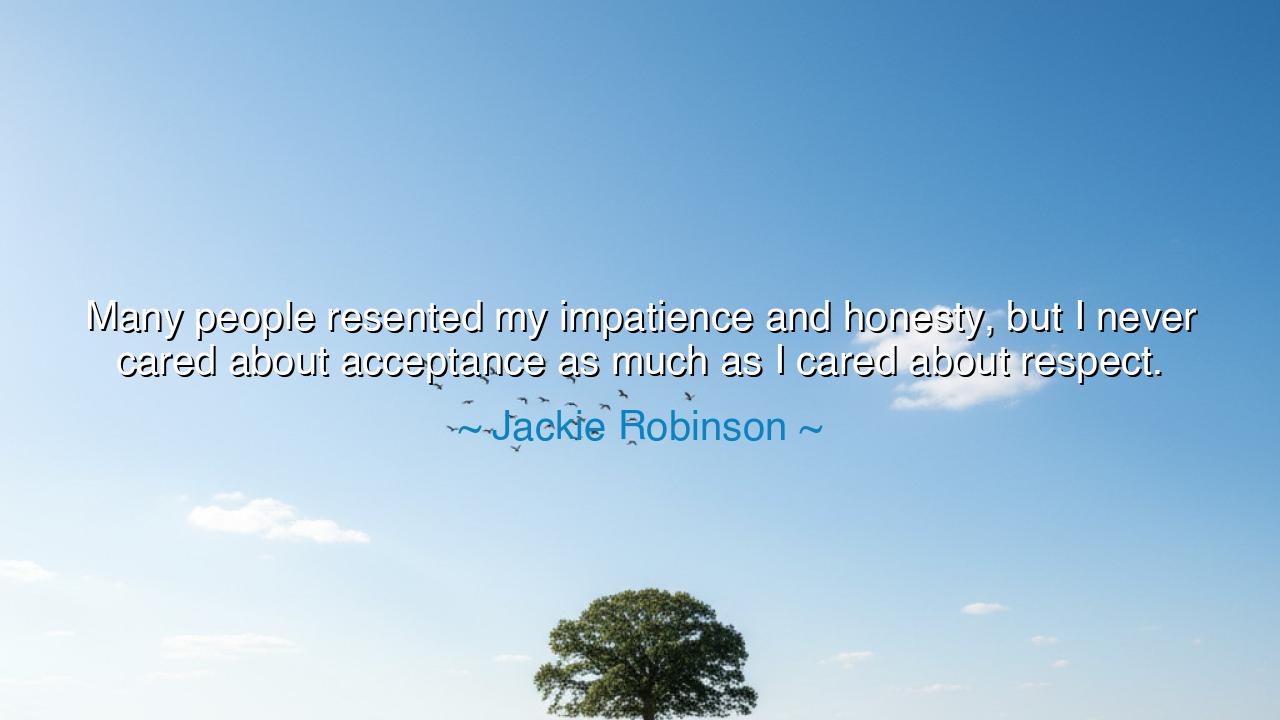
Many people resented my impatience and honesty, but I never cared
Many people resented my impatience and honesty, but I never cared about acceptance as much as I cared about respect.






In the words of Jackie Robinson, "Many people resented my impatience and honesty, but I never cared about acceptance as much as I cared about respect." These words resonate deeply within the heart of anyone who has ever faced adversity and sought to pave their own way, no matter the challenges. Robinson, a trailblazer in every sense of the word, was not only a pioneer in the world of baseball, but also a symbol of personal integrity and unwavering commitment to his principles. In a time when the world was steeped in racial prejudice and discrimination, Robinson chose to value respect over mere acceptance, even when the path to earning that respect was filled with hatred and misunderstanding.
The ancients understood the value of respect and the price that sometimes must be paid to achieve it. In Greek philosophy, Socrates taught that virtue was its own reward, regardless of the acceptance one received from society. He spoke of living a life of integrity and honesty, even when those around him failed to understand his ways. Socrates was sentenced to death, not because of his actions, but because his honesty and integrity challenged the conventional beliefs of his time. Similarly, Robinson faced criticism for his impatience and honesty, yet he remained committed to the idea that respect—both for himself and his fellow man—was worth far more than superficial acceptance.
Consider the example of Marcus Aurelius, the Roman emperor and philosopher, who despite his immense power, was deeply committed to the idea of virtue. He believed that respect for one’s own character was more important than gaining the approval of the masses. In his Meditations, Aurelius often spoke of the importance of acting in accordance with one’s principles, regardless of public opinion. Robinson's journey mirrored this same idea. In his struggle to break the color barrier in baseball, he faced public disdain, but he refused to be swayed by the approval of those who sought to diminish him. Instead, he chose to focus on maintaining his own integrity, knowing that true respect could not be bought or demanded, but earned through the strength of one’s character.
The story of Robinson’s entry into Major League Baseball is a powerful testament to the value of respect over acceptance. When Branch Rickey, the general manager of the Brooklyn Dodgers, offered Robinson the opportunity to play, it was not just a chance to play baseball—it was a challenge to face hatred, violence, and prejudice with dignity. Robinson's commitment to his values was tested daily, as he endured racial slurs, threats, and physical abuse. Yet, through it all, Robinson maintained his integrity, refusing to retaliate and giving those who resented him nothing but respect in return. His decision to value respect over acceptance became the foundation of his legacy, proving that respect comes not from conforming to societal expectations, but from standing firm in one’s own truth.
In Robinson's story, we also find the ancient wisdom of Cicero, who believed that the pursuit of honor was more important than public approval. In his writings, Cicero emphasized that true greatness was achieved through virtue and not through the flattery of crowds. Robinson, too, sought honor—not the fleeting kind that comes from acceptance, but the enduring respect that comes from staying true to one’s principles. His journey reminds us that greatness is often born not from seeking to fit in, but from daring to be authentic, even in the face of adversity.
The lesson here is clear: respect is not something that can be granted by others; it must be earned through honesty, integrity, and an unwavering commitment to one’s principles. As Robinson showed us, the path to respect is not always easy—it often requires sacrifice, courage, and the willingness to stand alone. But the reward is immense. By choosing respect over acceptance, we not only honor ourselves but also inspire others to rise above the constraints of societal expectations and live authentically.
In our own lives, let us reflect on the courage it takes to prioritize respect over acceptance. Whether in our work, relationships, or personal endeavors, let us choose to act with integrity, even when it is difficult or unpopular. Like Robinson, we may face challenges and adversity, but it is through staying true to our values that we build a legacy of respect that endures. Let us walk the path of honesty and virtue, understanding that true greatness is not measured by the applause of others, but by the respect we cultivate through our unwavering commitment to living with dignity and honor.






AAdministratorAdministrator
Welcome, honored guests. Please leave a comment, we will respond soon